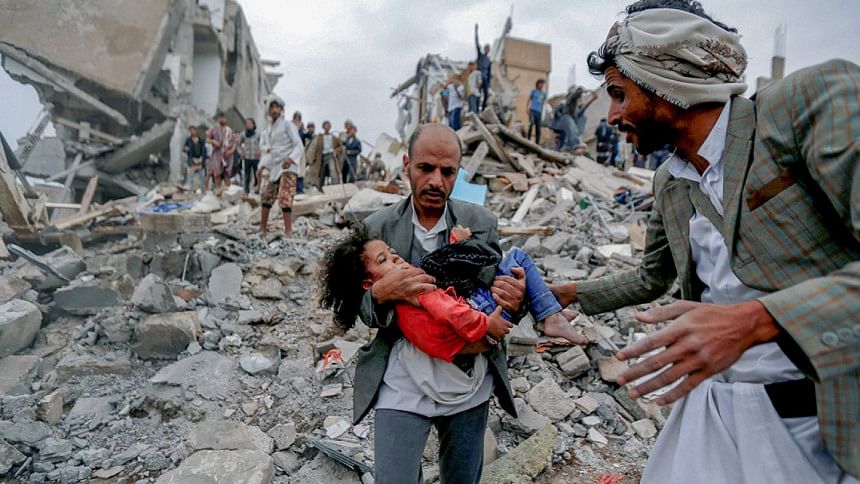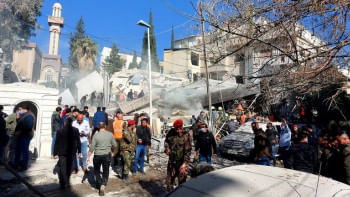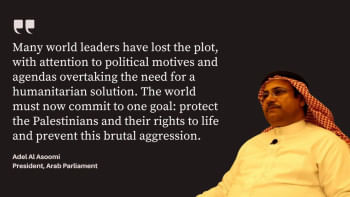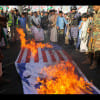The international contradictions of asymmetrical warfare in Yemen

In the ongoing discussion regarding the volatile situation in the Middle East, facts about Yemen's own humanitarian crisis are being overshadowed by the West's portrayal of the Houthis—the armed group controlling most parts of Yemen—as disruptive "global terrorists." The Houthis have vowed to disrupt shipping links with Israel in order to force Israel—and its allies—to end the genocide in Gaza. Hundreds of ships have been avoiding the Suez Canal due to the Houthis' attacks on ships connected to over 12 countries passing through the Red Sea since November 2023.
In response to the attacks, shipping companies have tripled prices for taking a container from Asia to Europe due to the extra cost of sailing around Africa in order to avoid the Red Sea. Although the increased shipping rates are not yet at pandemic levels, they are bad enough to potentially worsen inflation, and with it, the current cost of living crisis affecting the globe.
The facts regarding Yemen's history provide us the context to understand the Houthi attacks, not as acts of aggression, not even merely as acts of solidarity with Palestine, but also as acts of self-defence and resistance against US imperialism—which backs both Israel and Saudi Arabia—and whose bombs dropped on Yemeni hospitals, factories, and weddings and razed Yemen to the ground. Likewise, understanding Yemen's history allows us to understand the recent strikes by the US and the UK—which are meant to stop the Houthis but as of yet have not achieved anything—as an escalation of their violent, imperialist policy towards Yemen.
Before the current crisis in Occupied Palestine, the United Nations Office for the Coordination of Humanitarian Affairs called the situation in Yemen the worst humanitarian disaster in the world. According to the World Bank, 14 million people in Yemen are in "acute need of assistance," while 24.1 million are at risk of hunger and disease; about 18 million are without safe water and sanitation, while 16.2 million require urgent emergency assistance because of food insecurity and malnutrition.
Yemen suffers from severe fuel supply shortages, and disruptions of trade, infrastructure and financial services. The rial, Yemen's currency, was depreciated to historic lows in 2022, worsening the inflation crisis and extreme poverty. The situation is Yemen is so dire that it has significantly reduced humanitarian operations in the country. To make sense of it all, we have to go back to the beginning.
After the collapse of the Soviet Union was initiated in 1988, the socialist People's Democratic Republic of Yemen, also known as South Yemen, lost its primary pillar of economic support and formally dissolved in 1990. In 1990, South Yemen thought its best option was unification with the Yemen Arab Republic, also known as North Yemen, but by 1994 the South regretted that decision. A two month long war followed in which the South was defeated and forced to reunite with the North.
Amidst this background of political, economic, and ideological turmoil, some new political movements emerged. Among them was Ansar Allah, more commonly known around the world as the Houthi movement, from North Yemen. The Houthi movement was populist, anti-imperialist, anti-colonial, and religious or spiritual, ideologically based in a revival of Zaydism, a sect of Shia Islam. From the beginning, the Houthi were ideologically opposed to both the settler-colonial project of Israel, US imperialism in the Middle East, and the imposition of Wahhabism by neighbouring Saudi Arabia. During the early 2000's, Saleh, who ruled the Yemen Arab Republic, perceived the increasing strength of the Houthi movement as a threat to his stranglehold on power, to the point that he initiated a war against them in 2004. The sporadic nature of the war was such that it is often described as multiple wars, totalling about six, and are altogether known as the Sadaa Wars of 2004 to 2010.
In his bid for military support from the US and Saudi Arabia and legitimacy on the international stage, Saleh denied the popularity of the Houthi movement among Yemenis and painted them as mere Iranian proxies in an attempt to discredit them. In doing so, Saleh also obscured important ideological differences between the Houthis and the government of Iran. The state religion of Iran is Twelver Shi'ism, also known as Imamiyya, while the Houthis are devotees of Zaydi Shi'ism. In the coming years, waves of decentralised protests across the Arab world and popular unrest continued even after Saleh's resignation in 2012.
In August of 2014 tens of thousands of Yemenis once again took to the streets of Sanaa to protest against Hadi, who succeeded Saleh, and was accused of corruption. This time, the mass protest was organised and led by the Houthis. About a month after, Houthi insurgents took over Sanaa and, effectively, the government of Yemen during a five day operation with relatively few casualties, in what is often described as the "Battle of Sanaa." But the Houthis and their supporters describe it as a revolution. The Houthis dissolved the House of Representatives and established the Revolutionary Committee as a governmental body. Like any revolution, it was met with reactionary backlash, counterrevolution.
Having a vocally anti-colonial, anti-imperialist organisation in charge of a sizable territory in the Middle East frightened the US, especially since the US was then about a decade into its "Forever Wars" in the Middle East. Moreover, the Houthis' alliance with Iran was also a cause for concern for the US, since it has opposed Iran ever since the Iranian Revolution of 1979 which overthrew the US-backed monarch and autocrat Mohammad Reza Shah. Iran has been under US sanctions since 1979.
In 2015, under the codename "Operation Decisive Storm," Saudi Arabia, with the backing of the US, the UK, Canada, France, and South Korea, led the UAE, Sudan, Bahrain, Kuwait, Qatar, Egypt, Jordan, Morocco, and Blackwater mercenaries in a total war against Yemen. This included an extensive aerial bombing campaign and a blockade, in addition to an invasion by ground troops.
The US provided considerable military, intelligence, and logistical support for the Saudi coalition. The US accelerated the sale of weapons to Saudi Arabia and coalition states. Under former President Obama alone, when "Operation Decisive Storm" began, the US sold more than $115 billion worth of weapons to Saudi Arabia. The weapons sold included cluster bombs, which are illegal in 119 countries. Moreover, the extensive logistical support provided by the US included aerial refuelling (also known as in-flight refuelling) and search-and-rescue operations for downed coalition pilots. In addition, US and UK military officers were present in the command and control centre responsible for the bombings.
According to the UN, since 2015 more than 375,000 people, about 1.25 percent of the total population, have been killed by wartime violence in Yemen, and many more have died from hunger and disease. If we have the discernment and the humanity to call the ongoing humanitarian crisis in Occupied Palestine a genocide, then we should not hesitate to also describe what the Saudi forces—backed by the US, UK, France and Canada—has done to Yemen as genocide since 2015.
The direct strikes in Yemen this month by the US and the UK are making the worst case scenario in Yemen even worse. The humanitarian crisis in Yemen can only continue reaching ever more abysmal lows if the strikes by the US and the UK continue, especially given the fact that the Houthis currently do not have the economic capacity to repair the damage of the total war that has already been waged against them. It goes without saying, if the US and the UK escalate to a ground invasion of Yemen, the situation would devolve into a blood-soaked quagmire.
Adeeb Kasem is contributor to The Daily Star.
We welcome your contributions and analysis of global events. To submit articles to our weekly page, Geopolitical Insights, please send an email to [email protected]
Follow The Daily Star Opinion on Facebook for the latest opinions, commentaries and analyses by experts and professionals. To contribute your article or letter to The Daily Star Opinion, see our guidelines for submission.

 For all latest news, follow The Daily Star's Google News channel.
For all latest news, follow The Daily Star's Google News channel. 






Comments